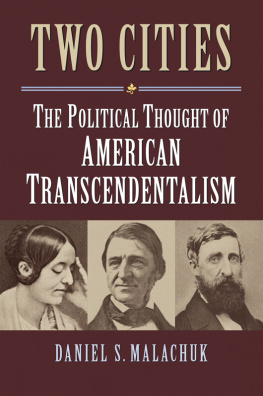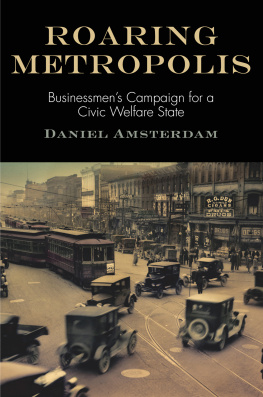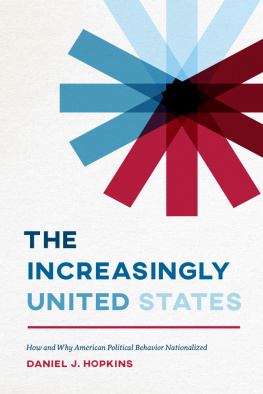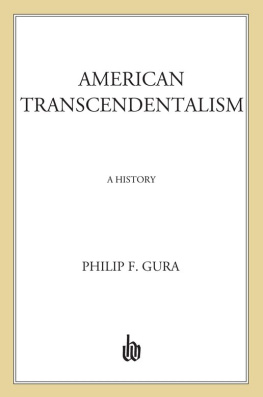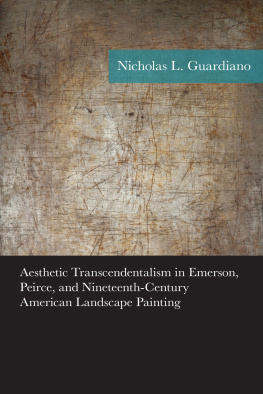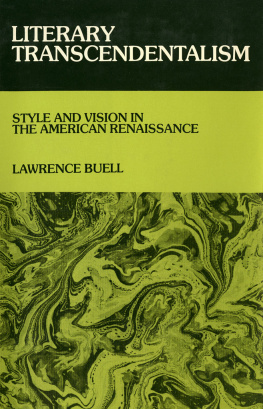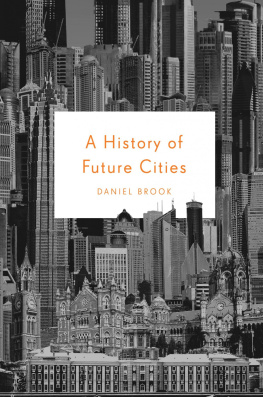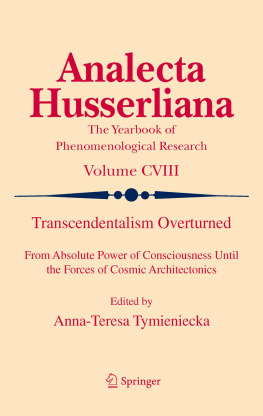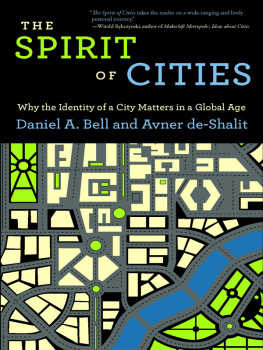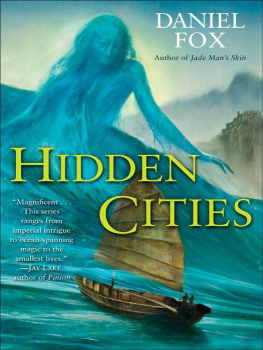Published by the University Press of Kansas (Lawrence, Kansas 66045), which was organized by the Kansas Board of Regents and is operated and funded by Emporia State University, Fort Hays State University, Kansas State University, Pittsburg State University, the University of Kansas, and Wichita State University
2016 by the University Press of Kansas
All rights reserved
Library of Congress Cataloging-in-Publication Data
Name: Malachuk, Daniel S., author.
Title: Two cities : the political thought of American transcendentalism / Daniel S. Malachuk.
Description: Lawrence, Kansas : University Press of Kansas, [2016] | Series: American political thought
Includes bibliographical references and index.
Identifiers: LCCN 2016028673
ISBN 9780700623020 (hardback)
ISBN 9780700623037 (ebook)
Subjects: LCSH: Political scienceUnited StatesPhilosophy. | Transcendentalism (New England) | Emerson, Ralph Waldo, 18031882Political and social views. | Thoreau, Henry David, 18171862Political and social views. | Fuller, Margaret, 18101850Political and social views. | BISAC: POLITICAL SCIENCE / History & Theory. | HISTORY / United States / 19th Century. | LITERARY CRITICISM / American / General.
Classification: LCC JA84.U5 M27 2016 | DDC 320.01dc23
LC record available at https://lccn.loc.gov/2016028673.
British Library Cataloguing-in-Publication Data is available.
Printed in the United States of America
10 9 8 7 6 5 4 3 2 1
The paper used in this publication is recycled and contains 30 percent postconsumer waste. It is acid free and meets the minimum requirements of the American National Standard for Permanence of Paper for Printed Library Materials z 39.481992.
For Katie and Paul
ACKNOWLEDGMENTS
Were it not for three breakthroughs this book would have remained in that perfect state which... I have imagined, but not yet anywhere seen, as Thoreau once wrote of something else. Hindsight also shows me that, while they seemed my own at the time, these epiphanies were all thanks to others. The first was when I realized that any book re-transcendentalizing the Transcendentalists ought to focus on the higher law moment. I discovered this historical moment in 2005 at the Library of Congress, where the staff led me to the databases that made this American obsession in the 1850s startlingly clear. I was able to grasp its significance, though, only thanks to a series of conversations with colleagues in Washington, DC, especially Paul Churchill, Karol Soltan, and Peter Levine. I was on leave then from Daniel Webster College, and for many conversations there I would also like to thank Don Wellman.
The second breakthrough came at a 2010 conference in Atlanta. Reflecting after lunch on our forthcoming collection on Emersons politics, Alan Levine, typically, wondered if our hero was really worth it: is Emerson a true political philosopher, he prodded, like Plato or Nietzsche, unafraid to question cows as sacred as democracy, or just another nineteenth-century liberal? Looking back, I believe the discussion that followed inspired the books second key contention: that the Transcendentalists not only sacralized the self but profaned democracy. My debt to Alan is tremendous, that conversation being just one of dozens during a wonderful period of intellectual collaboration. I would also like to thank all the other fine scholars who contributed to that volume, including Neal Dolan, Borden Flanagan, Jason Frank, Len Gougeon, Shannon Mariotti, Jim Read, and Chip Turner. In many ways this book continues conversations begun then.
After the Transcendentalists themselves, of course, the best reason to study them is their scholarly community. My thanks go to everyone I met on the conference circuit while presenting pieces of this project, especially Antonio Casado da Rocha, Phyllis Cole, Jeffrey Cramer, David Dowling, Mike Frederick, Greg Garvey, Bob Habich, Ethan Kytle, Wes Mott, Sandra Petrulionis, Todd Richardson, David Robinson, Dick Schneider, John Stauffer, David Voelker, Tiffany Wayne, and Mike Ziser. Like so many others in the field, I remain especially grateful for the guidance of Brad Dean. At Western Illinois University, I appreciate the support of Mark Mossman, chair of the English Department, and Susan Martinelli-Fernandez, dean of the College of Arts and Sciences, as well as that of the Provosts Office, the Center for Innovation in Teaching and Research, the Office of Sponsored Projects, and my students over the years.
The final breakthrough was when I recognized the Transcendentalists often depicted higher law and democracy as rival places. This happened during a 20132014 sabbatical when I myself had a chance to visit some very nice places, starting with an idyllic fall at the Notre Dame Institute for Advanced Study at the University of Notre Dame. I am very grateful for the support of the people who work there, including Brad Gregory, Don Stelluto, Grant Osborne, Carolyn Sherman, and Eric Bugyis; my fellow Fellows, including Robert Audi, Carl Gillett, Ethan Guagliardo, Douglas Hedley, Scott Kenworthy, Jonathan Marks, Gladden Pappin, Bharat Ranganathan, and Scott Shackelford; and several supportive faculty at that university, including Patrick Deneen, Mark Noll, Michael Zuckert, and especially Laura Dassow Walls. My sabbatical spring as a Fulbright Senior Lecturer at the University of Heidelberg was equally rewarding in introducing me to the generous faculty there, most of all Ulrike Gerhardt, Gnter Leypoldt, Dieter Schulz, and Jan Stievermann. While in Europe, I also had several opportunities to share my thesis, for which I would like to thank Michael Foley at the University of Groningen, Thomas Constantinesco at the University of Paris VII, and Katja Sarkowsky at the University of Muenster. For generously welcoming me to their home as well as to the University of Bordeaux, I would especially like to thank Joseph and Michle Urbas.
My superb experience with the University Press of Kansas began with its director, Charles T. Myers, and the readers, David M. Robinson and an anonymous scholar. I am also grateful for the assistance of Kelly Chrisman Jacques, Sara Henderson White, Larisa Martin, Carol A. Kennedy, Michael Kehoe, Karl Janssen, and Rebecca J. Murray.
That we still take the Transcendentalists seriously today is thanks mainly to the innovative work of a handful of scholars a few decades ago. While my differences with Lawrence Buell, Stanley Cavell, and George Kateb will emerge in what follows, I would not have written this bookor anything else about the Transcendentalists, franklywithout the inspiration and provocation of their scholarship. For these reasons, too, I will always be grateful I was able to study with another of Transcendentalisms great twentieth-century champions, Richard Poirier.
Finally, a few more personal acknowledgments are in order. For their professional kindness and example to me over the past decade, I would like to thank Amanda Anderson, Lauren Goodlad, and Marianne Noble. For their friendship to me and my family when we lived in DC and beyond, I thank Matt and Joanne Gernstein London. My indispensable WIU-QC colleague Everett Hamner has walked with me through many of the arguments here. For sharing his house in Transcendentalist country every summer and much more, I thank my father-in-law, Paul Reinhardt. Now is a good time to thank one of my wonderful grandmothers, Viola Malachuk, who has always encouraged my learning, and to remember another, the late Isabel Ford, who taught me much that I then rediscovered in Thoreau. Loving thanks are due to my siblings, Mike and Katie, and our parents, Dan and Ginger, who have always been unstinting in their support. Finally, and with the promise of no more talk of breakthroughs, I dedicate this book to my wife, Katie Reinhardt, and our son, Paul, who together teach me daily what simplify, simplify really means.


